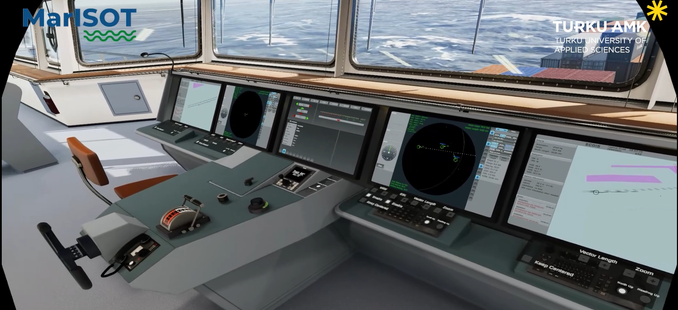
Maritime industry VR training applications developed by Turku University of Applied Sciences attract interest around the world
Maritime VR training applications attracted great interest at the Turku University of Applied Sciences’ booth during Posidonia, a major shipping exhibition held in the early summer in Athens. The applications are currently being tested in collaboration with the Swedish Chalmers University of Technology.
Text: Martti Komulainen
– Portability, price and versatile data collection possibilities, lists Principal Lecturer and Research Group Leader Mika Luimula when asked about VR applications’ benefits compared to simulators regarding, for example, various training applications for ship or port environments.
Traditionally, sea captains have trained ship manoeuvres in simulation centers, in addition to training at sea, but simulator centers that provide the most realistic possible experience are scarce and expensive.
Luimula is the leader of Turku University of Applied Sciences’ Futuristic Interactive Technologies research group. Early this summer in Athens, the research group presented maritime VR training applications developed at Turku University of Applied Sciences, and there was a great deal of interest.
Luimula sees a clear market opportunity and, as part of the MariSOT project funded by Business Finland, the intention is to explore business opportunities and pave the way for a possible start-up company.
Chalmers’s future maritime professionals produce data for further development
There is an on-going collaboration with Chalmers University of Technology in the development of applications related to maritime safety.
Future deck officers and sea captains trained at the university have tested a VR application that trains ship collision avoidance. Students’ eye movements and actions and the movements, placement and direction of other vessels have been registered in a versatile manner. The available data increases understanding of actions taken during training and helps in the further development of applications.
– In maritime industry, in particular, there is a need to move to on-board training in maritime safety training, this is not only an important effectiveness and cost issue but also a critical safety issue in the world. MarISOT project is trying to find solution to this problem with VR-training technology, says the project manager of the MariSOT project, Senior Lecturer Juha Saarinen.
The next step in VR applications is multi-user environments. There is talk of the metaverse, which is the next level of virtuality, consisting of virtual spaces formed by several users.
– The research group has a clear understanding of the direction towards which the development of training applications is going around the world. In the future, training will take place in multi-user environments. The research group is developing its own metaverse technology, which creates an excellent starting point for building multi-user training modules that especially emphasise collaborative work, says Mika Luimula.

